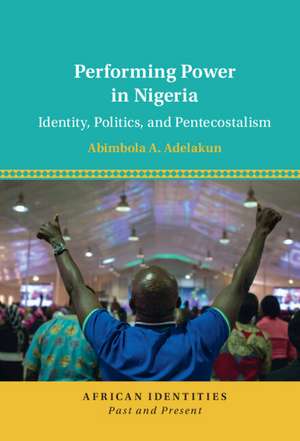Performing Power in Nigeria: Identity, Politics, and Pentecostalism: African Identities: Past and Present
Autor Abimbola A. Adelakunen Limba Engleză Paperback – 6 sep 2023
| Toate formatele și edițiile | Preț | Express |
|---|---|---|
| Paperback (1) | 177.53 lei 6-8 săpt. | |
| Cambridge University Press – 6 sep 2023 | 177.53 lei 6-8 săpt. | |
| Hardback (1) | 530.32 lei 3-5 săpt. | +24.88 lei 6-12 zile |
| Cambridge University Press – 10 noi 2021 | 530.32 lei 3-5 săpt. | +24.88 lei 6-12 zile |
Preț: 177.53 lei
Nou
Puncte Express: 266
Preț estimativ în valută:
33.97€ • 35.47$ • 28.11£
33.97€ • 35.47$ • 28.11£
Carte tipărită la comandă
Livrare economică 04-18 aprilie
Preluare comenzi: 021 569.72.76
Specificații
ISBN-13: 9781009281744
ISBN-10: 1009281747
Pagini: 300
Dimensiuni: 228 x 151 x 20 mm
Greutate: 0.4 kg
Ediția:Revizuită
Editura: Cambridge University Press
Colecția Cambridge University Press
Seria African Identities: Past and Present
Locul publicării:Cambridge, United Kingdom
ISBN-10: 1009281747
Pagini: 300
Dimensiuni: 228 x 151 x 20 mm
Greutate: 0.4 kg
Ediția:Revizuită
Editura: Cambridge University Press
Colecția Cambridge University Press
Seria African Identities: Past and Present
Locul publicării:Cambridge, United Kingdom
Cuprins
Introduction; 1. Demons and Deliverance: Discourses on Pentecostal Character; 2. 'What Islamic devils?!': Power Struggles, Race, and Christian Trans-nationalism; 3. 'Touch not Mine Anointed': #MeToo, #ChurchToo, and the Power of 'See Finish'; 4. 'Everything Christianity/the Bible Represents is being Attacked on the Internet!': The Internet and Technologies of Religious Engagement; 5. 'God too laughs and we can laugh too': The Ambivalent Power of Comedy Performances in the Church; 6. 'The Spirit Names the Child': Pentecostal Futurity in the Name of Jesus; Conclusion: Power Must Change Hands: COVID 19, Power, and the Imperative of Knowledge.
Notă biografică
Descriere
Uses extensive archival material, interviews and fieldwork to explore how Nigerian Pentecostals mark their self-distinction as a people of power.
Recenzii
'The book treads new ground, bringing religion and performance studies into a richly creative tête-à-tête, in which performing Nigerian Pentecostalism translates lived imagination, experience, and praxis into sacred reality. Spiritual power and temporal politics are acted out via the aestheticization and dramatization of Pentecostalism, thus giving it a unique religious niche and identity.' Afe Adogame, Princeton Theological Seminary
'This book boldly expands the disciplinary frontiers of Pentecostal studies from anthropology, history and political theory into performance studies, focusing on its creative and dramaturgical expressions of power. This approach and the insightful analysis it generates will no doubt appeal to scholars of Nigerian Pentecostalism from various disciplines.' Olufunke Adeboye, University of Lagos
'Performing Power in Nigeria is an excellent study of religion and Pentecostalism in contemporary Nigeria. Drawing from her brilliant scholarship on performance and creative expressions of culture and power, Abimbola Adelakun provides a splendid analysis of the spectacular display of Pentecostal spiritual power and identity.' Annalisa Butticci, Georgetown University
'This book boldly expands the disciplinary frontiers of Pentecostal studies from anthropology, history and political theory into performance studies, focusing on its creative and dramaturgical expressions of power. This approach and the insightful analysis it generates will no doubt appeal to scholars of Nigerian Pentecostalism from various disciplines.' Olufunke Adeboye, University of Lagos
'Performing Power in Nigeria is an excellent study of religion and Pentecostalism in contemporary Nigeria. Drawing from her brilliant scholarship on performance and creative expressions of culture and power, Abimbola Adelakun provides a splendid analysis of the spectacular display of Pentecostal spiritual power and identity.' Annalisa Butticci, Georgetown University






